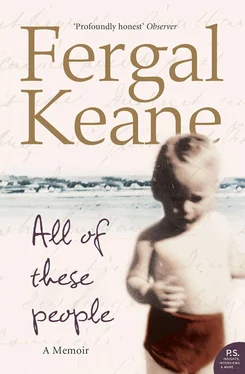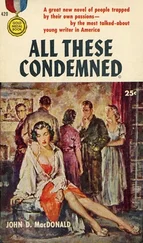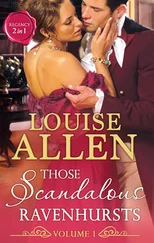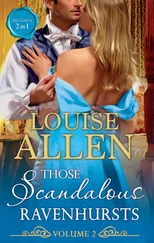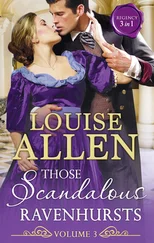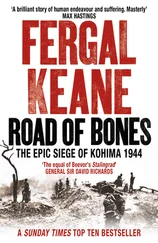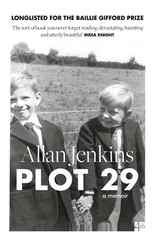‘Are you listening, O’Cathain? Are you paying attention? Come up here and explain to the class what you were thinking about.’
‘Nothing, Bean Ui Bhanseil. Nothing.’
‘Don’t mind your nothing. What was I teaching just now? What did I read?’
‘I can’t remember. I’m sorry.’
Tabhair dom do labh. Give me your hand.
There. Now go back to your seat and pay attention. Don’t be crying like a mammy’s boy.
Other kids say that too. Mammy’s boy. They know how to get me going. A boy called Grant, a big fellow, always in trouble with the teachers, shouts at me one day: ‘Your mammy’s a pig.’ I attack him. I have no idea where the strength comes from but I go for the bastard and hurt him, until he gets over the shock and starts to hurt me. Punch, kick, punch. I am left sitting on the ground crying. Grant is right. I am my mother’s boy. I cling to her. I am her confidant.
As I get older I often sit up late with her. I have learned to make calculations. I know that if teatime passes, and homework time, and there is still no sign of him, there is a chance that my father is drinking. And if the evening news comes and goes without him I know it is a certainty. My mother corrects school homework. I watch the television. We wait. After the national anthem has played on RTE my mother switches off the television.
I have grown used to this tension and fear. It is my homeland. And here is the hardest thing to admit: I love being this boy who stays up late, this child who imagines himself as his mother’s protector, the boy who can listen to confidences, who is praised for being so mature. That’s me: Little Mr Mature. You could tell him anything.
My father always smiles when he sees me. He pulls me towards him, always gently, and I smell the smell that is half sweet and half stale, fumes of hot whiskey breath surround me and fill the room. He tells me that he loves me and he hugs me, again and again. If he is in a happy drunk state he tells stories about people he met on the way home – impossibly sentimental stories of kindnesses given and received; but if he’s angry he will curse some enemy of his at work, some actor who is conniving against him, some producer who doesn’t know his arse from his elbow. He can rage bitterly. I don’t know why sometimes he is happy and other times angry. My father has never raised his hand to me. Nor can I remember him ever being consciously cruel to me. It is his anger that scares me, the violence that takes over his voice. Through it all I keep an eye on my mother, until she signals that I should go to bed, and reluctantly I climb the stairs.
Sometimes from upstairs I hear a louder voice. It echoes up the hallway. This voice is beyond control. I keep my eyes on the lights of cars flashing their beams across the ceiling. I put my hands to my ears. Downstairs I hear the sound of my childhood splintering. Only when it is quiet, long after it is quiet, do I sleep.
It is still a few years to their separation. At this point nothing is determined. I do not sense that a sundering is close. I am not afraid that they will break up. In this Ireland families do not break up because of drink. Families like us stay together. Instead I have this fear that they will both die. It comes to me in dreams. I dream that they are killed in a car crash and I wake up crying.
Many young men of twenty said goodbye. On that long day, From the break of dawn until the sun was high Many young men of twenty said goodbye.
‘Many Young Men Of Twenty’, JOHN B. KEANE
I had come back to Ireland with my parents in 1961, as thousands of their fellow countrymen were heading the other way. Our people clogged the mail boats to Holyhead with their cardboard suitcases and promises of jobs on the building sites. Éamonn and Maura lived in a succession of flats and boarding houses. They had little money. My father had acting work but if he started drinking there was no money. There were days of plenty and days of nothing. By now my mother was pregnant again. Two more children would follow in the next two years. Saving money for a deposit on a house was out of the question. Eventually they were given a house by the Dublin Corporation in one of the vast new council estates being built to the west of the city, in Finglas. In those days the tenements of inner-city Dublin were being cleared and the residents moved to vast new housing estates on the fringes of the city. One nineteenth-century writer described Finglas as a village where ‘the blue haze of smoke from its cottages softened the dark background of the trees’. But by the time we arrived there there were no cottages or trees. The green fields had been turned into avenue upon avenue of concrete.
In keeping with the nationalist ethos of the Republic many of the streets on the new estates were named after heroes of rebellions against the British. Go onto any council estate in Ireland and you will find streets named after guerrilla leaders. My parents were given the keys to a two-bedroom terraced house on Casement Green, named after Sir Roger Casement.
Éamonn and Maura would have stood out among the residents of Finglas. They were neither Dubliners nor working class. Both were well educated. Most of those they lived among had grown up on the hard streets of the inner city and left school at an early age to find work. It was said then of Finglas, and not quite jokingly, that it was so tough even the Alsatians walked around in pairs.
Our next-door neighbour was Breda Thunder. At dinner time her house smelled of boiled bacon ribs and cabbage, and chips with salt and vinegar. Breda was a handsome woman with auburn hair and laughing eyes – a native Dubliner, from Charlemont Street near the Grand Canal. Her husband Liam was a thin and wiry redhead and came from Rathmines on the other side of the canal. Breda and Liam arrived on the estate a few weeks after my parents. Years later Breda told me: ‘The first time I saw you, you were standing on your own in the garden near our fence, a lovely little boy with blond hair, just standing there and smiling. That’s how I’ll always see you.’
I loved her because she seemed so fearless. You felt safe around Breda. She was the first person I knew who showed no fear when my father was drunk. Breda had grown up in tenement Dublin, on some of the toughest streets in Europe, in an atmosphere where women learned early how to deal with men who drank, and where the only dependable wage for many was the ‘shilling a day’ earned in the service of the British military. Her own father, Jamesy Harris, had served in both world wars, and her grandfather fought in the Boer War. Breda had a good soldier’s courage.
Breda and Liam had five boys and had fostered a girl – the daughter of Liam’s brother Paddy who had been killed serving with the Irish Guards in Aden. Her sons were my first playmates. They were boisterous and noisy and loyal. The neighbourhood bullies knew to give the Thunder boys a wide berth. Pick on a Thunder or on any of their friends, and you had the whole clan to deal with. Once, a young policeman collared Breda’s second youngest son, Sean, for cycling on the pavement outside her house. The child was about five, and quite obviously too young to head out onto the open road. Breda looked out the window and saw the very tall policeman haranguing her child. Seconds later she was bearing down on him:
‘Where are you from?’ she demanded.
He replied that he came from County Mayo.
This triggered an automatic resentment in Breda’s heart. She was a proud Dubliner, convinced that the city had no equal anywhere in the world and believing that visitors to the city owed a debt of respect to the natives. Any public official from County Mayo or any of the remoter rural areas would initially have been regarded with suspicion by Breda and her neighbours. Only after proving themselves as decent souls would they be welcomed. To have a culchie – a country person – even if he was a policeman, tell her son he couldn’t cycle on Dublin concrete was an appalling insult.
Читать дальше
